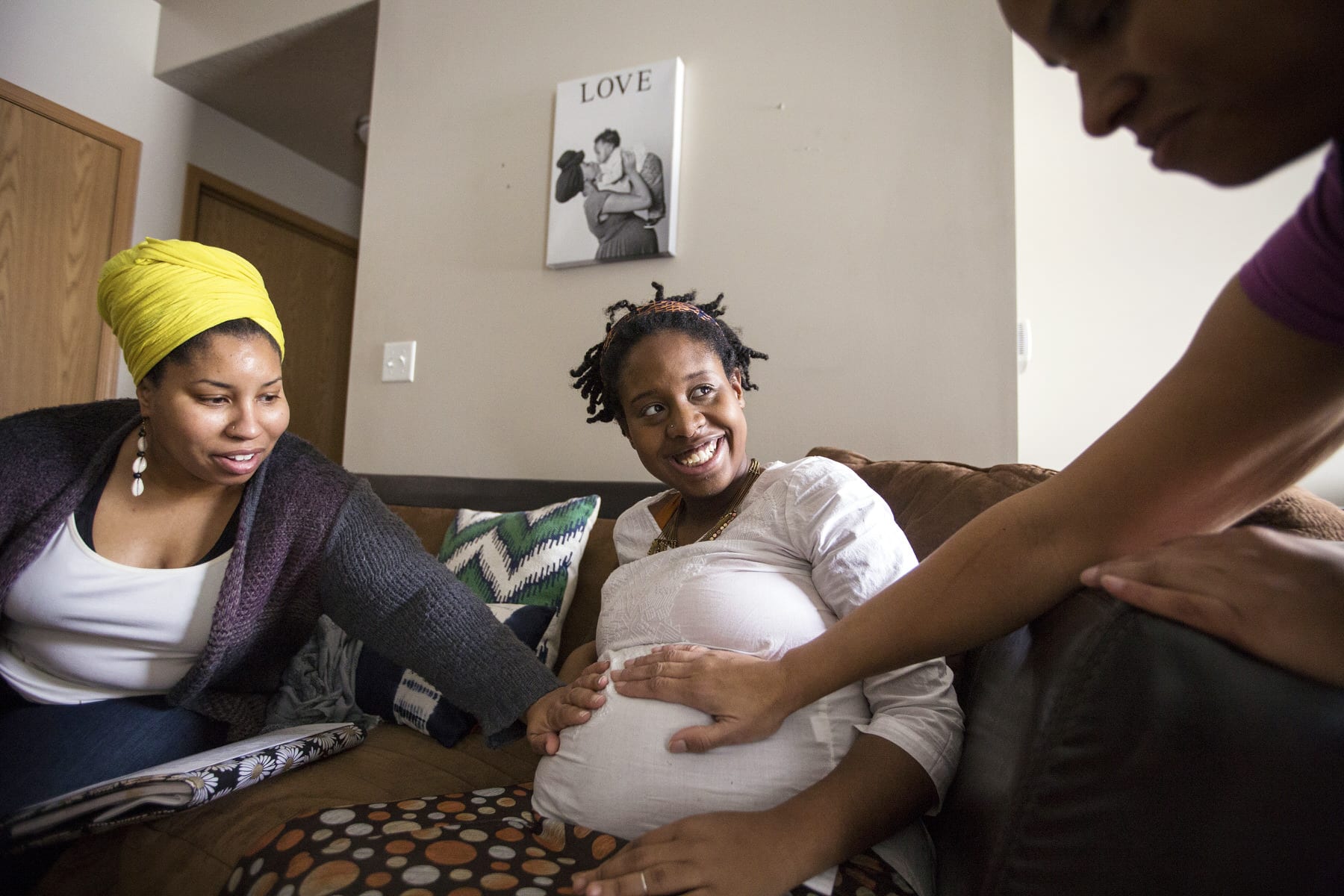Martine Wilson can look into a pregnant person’s eyes and see an entire hidden story. And even as Wilson’s work has been relegated to Zoom and only occasional visits to homes, she can still sense something is wrong: The rates of postpartum depression have never been this high.
Wilson, who is based in Sacramento, California, has been a home birth midwife and doula for over 20 years. She’s had a front-row seat to the mental health struggles pregnant people have faced this past year, particularly the Black women she serves.
Wilson’s clients were fearful before the pandemic. When they struggled to put a name to a feeling, or when they said that they were “just fine,” Wilson sensed that they were struggling behind closed doors — feeling unheard by doctors, disconnected from the baby or worried they won’t be able to support their family.
Now those feelings are coupled with additional pandemic-related worries: The fear of passing on the virus and the isolation from loved ones has overwhelmed pregnant people. These new barriers have undoubtedly increased rates of postpartum depression and anxiety in new caregivers this year, Wilson, advocates and physicians tell The 19th.
“Most mothers [were] going in [to labor] without their partner, without their doula, and these moms were terrified. This brought on stress that wasn’t even there,” Wilson said.
In the last year, researchers saw “severe increases” in cases of depression and anxiety for new birthing parents according to a recent study from the Reproductive Health Journal — with cases at roughly three to four times the normal rates.
This increase amounts to a “mental health tsunami” said Dr. Samantha Meltzer-Brody, a psychiatrist and director at the Center for Women’s Mood Disorders at the University of North Carolina. It’s the disruption to daily life that compounds the already-felt challenges of the perinatal period, she said.
“It is such a profoundly difficult and vulnerable time and the disruption of the pandemic on the lives of perinatal women must be addressed to address the mental health crisis,” Metlzer-Brody said. “The demand for mental health services has been extraordinary. It’s at least double or more, and it’s not that you just turn on a dime and then double your workforce to address it.”
Postpartum depression was already extremely common pre-COVID. Nationally, about 1 in 8 women experience it, according to the Centers for Disease Control and Prevention, a number that could be underreported due to undiagnosed cases.
Studies show that women of color and low-income women are several times more likely to suffer from postpartum depression, yet less likely to receive treatment. Experts cite financial barriers to treatment options and stigma of seeking treatment as core reasons for the increase in pregnancy-related mental health issues among people of color. Advocates say many Black people, particularly, struggle in silence and are less likely to get treatment because of a distrust in health systems. The pregnancy-related mortality rates remain disproportionately high among Black people, leading new parents to fear hospitals and opening up to physicians, Wilson said.
It’s been shown that doulas who work with Black pregnant people and low-income pregnant people have helped “mitigate the negative effects of social determinants of health, specifically racism and classism” according to a study from Health Equity. In her work as a doula and midwife, Wilson specifically addresses fears and experiences that are specific to the Black community that are rarely addressed at checkups.
Doulas have historically helped fill a gap in the mental health industry as non-medical support workers, many centering their work around Black women to advocate for those historically ignored by medical systems. They function as educators and supporters, coaching clients and their families — who may be skeptical and fearful — through the birthing process before, during and after the birth. Many will attend perinatal appointments, helping to go through medical terminology and focus on holistic approaches to a healthy pregnancy and birth like sleep, nutrition and mental health.
Midwives, meanwhile, have specific medical training to assist with the birthing process and expertise to deliver the baby. They also function as physical and emotional support for pregnant people before and after the birth.
With a clear focus on the wellbeing of the mother, doulas and midwives remain at the forefront of advocacy for additional resources for parents who they have seen struggle with postpartum depression. And their work begins long before birth.
“Building that trust up and going over the fears that these moms have because now these moms are going ‘I fear that I’m gonna die if I go to have a baby,’” Wilson said.
That has become all the more critical during the pandemic. Due to upwards of months on waitlists for mental health specialists, midwives and doulas have been tirelessly working to fill even a portion of the crucial mental health gap.
Despite the need, the United States has an average of 20 psychologists per 100,000 people and 15.6 psychiatrists per 100,000 people. As the pandemic lingers, even more people have reported a decline in their mental health. Waitlists can last up to years, especially in rural areas where there is less than one mental health professional for every 30,000 people.
Doulas specifically act as educators and supporters throughout the entire year postpartum. Typically, the screening for postpartum depression does not happen until week six after birth, leaving many to struggle without a diagnosis. Further, the questionnaire is not always culturally sensitive, Wilson said, and often will not help identify a mental health need for Black women.
Wilson advocates for a universal screening system for postpartum depression in the earliest stages, in which questions are culturally sensitive and recognize that Black mothers can be less likely to admit feeling depressed or anxious. This is because many Black women still suffer from historical conditioning in which they were merely a “machine” for childbearing, something “deeply rooted in our DNA,” Wilson said.
Doulas have training in catching the signs early and aiding new parents by talking through their fears long before the required postpartum checkup. They also have the ability to refer their client to another psychologist if they see it best fit.
But affording a doula can be a concern, Wilson said. The cost ranges from several hundred dollars to over $2,000, with the cost in California, where Wilson operates, averaging around $1,200 to $1,500. Many clients Wilson encounters cannot afford doula services; sometimes Wilson and her colleagues front the costs without reimbursements from states. According to a survey completed by the National Health Law Program, 55 percent of doulas reported that they provided their services on a volunteer or pro bono basis.
Tiffany Towsend, a mother of five and a doula in Grand Rapids, Michigan, created a GoFundMe this past summer to help establish grant opportunities and reduce the barriers of accessing a doula or midwife for mothers during the pandemic. Like Wilson, she works specifically with Black clients.
During COVID, mothers in Towsend’s community have faced financial barriers to mental health services, and many cannot afford a doula or midwife. This idea of “wellness” is just for the rich, she said. While doulas have been critical for many Black people, many have consequently not been able to afford one unless they have private insurance.
“All it comes down to is money … If you don’t have money, you don’t have access,” Towsend said.
A recent study from Mathematica, a think tank that works at the intersection of data and policy, found that for one year of childbirths in Texas alone, untreated maternal mental health conditions, such as postpartum depression, create an estimated $2.2 billion in societal costs from conception through five years postpartum, with financial burdens hitting Black people the hardest.
Of the $2.2 billion in costs, $1 billion goes to Medicaid. Thursday, in recognition of Black Maternal Health Week, U.S. Rep. Ayanna Pressley introduced a bill that would make postpartum Medicaid mandatory, lessening the financial burden for those seeking mental health or doula services postpartum.
The bill would also allow a pregnant person to have a supporter, like a doula, spouse or family member, present in the hospital. During COVID, many doulas — who are not commonly considered essential health workers — were not allowed inside hospitals.
“Naturally for a tradition of support that is so inherently physical in nature, this created many challenges for birth doulas and the clients that they served,” said Amy Chen, senior staff attorney at the National Health Law Program. Her advocacy group pushes for doula services to be included under Medi-Cal enrollees in California, where half of all births are funded by Medi-Cal.
Currently, there are only three states that have passed legislation implementing third-party reimbursement for doula services: Indiana, Oregon and Minnesota, though Indiana does not include funding for their initiative, according to the Maternal Health Task Force. Five federal bills have also been introduced that relate to Medicaid coverage for doula services. If passed, these bills could help pregnant people in need of support find a way out, Wilson said. In the meantime, community-based doulas like Wilson and Towsend have been filling the gap and taking on the burden of paying for their own services themselves.
“Extending funds to doulas would allow us to continue to support, educate and provide resources to pregnant persons and their families,” Wilson said. “When we are able to assist families from marginalized communities we can create awareness, provide culturally competent care and advocate for policies centered on birthing families.”
Treysha Campbell, 24, has three children, including one 3-month-old. She works as a nursing assistant in North Carolina, and after she had her baby, she became increasingly stressed trying to find daycare options for her children. She needed to work to keep her family afloat, she said.
Campbell would have anxiety attacks and nightmares weekly, constantly in a state of panic, she said. But she said as a Black woman, she felt she couldn’t just say, “OK, I’m depressed.”
Campbell’s sister came to help take care of her newborn and was a major reason she was able to get back to work, Campbell said, recognizing that the pandemic has made it increasingly difficult to get help from friends and family. She feels fortunate enough to have had a midwife to counsel her and also assist with referral options to a constant mental health professional. She began to adopt a mindset that kept her going, to focus on her breathing instead of her pain.
“It’s been stressful finding childcare for [my children] in order for me to go to work,” Campbell said. “I’ll go into panic thinking so far ahead into the future like thinking how am I gonna do this next week or next year … I found it a lot easier and less stressful to just think about now, like today. Live for today.”
Counting on someone to talk her feelings through with made the difference, Campbell said. Without her midwife, she doesn’t know how she would have made it through her pregnancy, she said.
Wilson most recently worked with a client, a pregnant woman who Wilson could tell needed help and proper care but could not afford a doula. Wilson messaged a few friends with extra funds to see if they could cover the expenses. They could. But it shouldn’t be like this, Wilson said. The woman had her baby last month with no complications.
“If I didn’t have the knowledge to be able to pick up something like that, she may not have made it to full term,” Wilson said. “Mental health is slipping through the cracks, especially postpartum depression. You got to talk to the people. You’ve got to see what’s going on inside their personal life because that’s gonna affect their babies. It’s gonna affect everything.”





